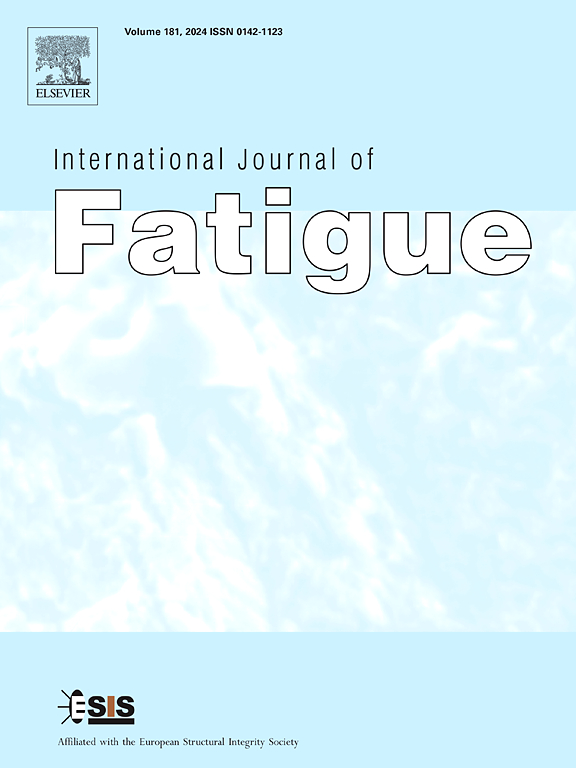用空心玻璃微球增强的铝基复合材料的疲劳裂纹增长率特性
IF 5.7
2区 材料科学
Q1 ENGINEERING, MECHANICAL
引用次数: 0
摘要
本研究调查了纯铝和铝空心玻璃微球金属基复合材料(Al + HGM MMCs)铸板的纳米压痕和疲劳裂纹生长率。采用搅拌铸造法制造了纯铝和铝 + HGM 金属基复合材料,其中空心玻璃微球(HGM)的添加量按重量计从 5 % 到 30 % 不等。利用纳米压痕技术评估了硬度和弹性模量等基本机械性能。本研究主要侧重于分析这些搅拌铸造板在 da/dN vs. ΔK 图线性区域内的疲劳裂纹生长行为。按照 ASTM E-647 标准制备了雪佛龙缺口 CT 试样,并采用恒定振幅增加 ΔK 法生成巴黎曲线。此外,研究还探讨了应力比(R=0.1、0.2 和 0.3)对纯铝和铝 + HGM MMC 疲劳裂纹生长率的影响。研究还确定了这些板材的临界值和临界应力强度因子范围(ΔKth 和 ΔKc)。此外,还计算了巴黎常数(C、m),以确定铸板的疲劳行为特征。X 射线衍射分析揭示了疲劳断裂试样的位错密度、结晶尺寸和微应变响应。此外,扫描电子显微镜(SEM)断口成像分析有助于深入了解纯铝和铝 + HGM MMCs 板材的断裂行为和裂纹分支情况。本文章由计算机程序翻译,如有差异,请以英文原文为准。
Fatigue crack growth rate behaviour of aluminium matrix composites reinforced with hollow glass microsphere
This study investigates nanoindentation and fatigue crack growth rates of pure aluminium and aluminium hollow glass microsphere metal matrix composite (Al + HGM MMCs) cast plates. Using the stir casting method, pure aluminium, and Al + HGM MMCs were fabricated with hollow glass microsphere (HGM) additions ranging from 5 % to 30 % by weight. Nanoindentation techniques were utilized to assess fundamental mechanical properties such as hardness and elastic modulus. This study primarily focuses on analyzing fatigue crack growth behaviour within the linear region of da/dN vs. ΔK graphs for these stir-cast plates. Chevron-notch CT specimens were prepared following ASTM E-647 standards, and the constant amplitude increasing ΔK method was employed to generate Paris curves. Furthermore, the research investigated the influence of stress ratios (R=0.1, 0.2, and 0.3) on the fatigue crack growth rate in both Pure Al and Al + HGM MMCs. The study also determined the threshold and critical stress intensity factor ranges (ΔKth and ΔKc) for these plates. Additionally, Paris constants (C, m) were calculated to characterize the fatigue behaviour of the cast plates. X-ray diffraction analysis was conducted to reveal dislocation densities, crystalline sizes, and micro-strain responses of the fatigue-fractured specimens. Moreover, SEM fractography analysis provided insights into the fracture behaviour and crack branching observed in both pure aluminium and Al + HGM MMCs plates.
求助全文
通过发布文献求助,成功后即可免费获取论文全文。
去求助
来源期刊

International Journal of Fatigue
工程技术-材料科学:综合
CiteScore
10.70
自引率
21.70%
发文量
619
审稿时长
58 days
期刊介绍:
Typical subjects discussed in International Journal of Fatigue address:
Novel fatigue testing and characterization methods (new kinds of fatigue tests, critical evaluation of existing methods, in situ measurement of fatigue degradation, non-contact field measurements)
Multiaxial fatigue and complex loading effects of materials and structures, exploring state-of-the-art concepts in degradation under cyclic loading
Fatigue in the very high cycle regime, including failure mode transitions from surface to subsurface, effects of surface treatment, processing, and loading conditions
Modeling (including degradation processes and related driving forces, multiscale/multi-resolution methods, computational hierarchical and concurrent methods for coupled component and material responses, novel methods for notch root analysis, fracture mechanics, damage mechanics, crack growth kinetics, life prediction and durability, and prediction of stochastic fatigue behavior reflecting microstructure and service conditions)
Models for early stages of fatigue crack formation and growth that explicitly consider microstructure and relevant materials science aspects
Understanding the influence or manufacturing and processing route on fatigue degradation, and embedding this understanding in more predictive schemes for mitigation and design against fatigue
Prognosis and damage state awareness (including sensors, monitoring, methodology, interactive control, accelerated methods, data interpretation)
Applications of technologies associated with fatigue and their implications for structural integrity and reliability. This includes issues related to design, operation and maintenance, i.e., life cycle engineering
Smart materials and structures that can sense and mitigate fatigue degradation
Fatigue of devices and structures at small scales, including effects of process route and surfaces/interfaces.
 求助内容:
求助内容: 应助结果提醒方式:
应助结果提醒方式:


